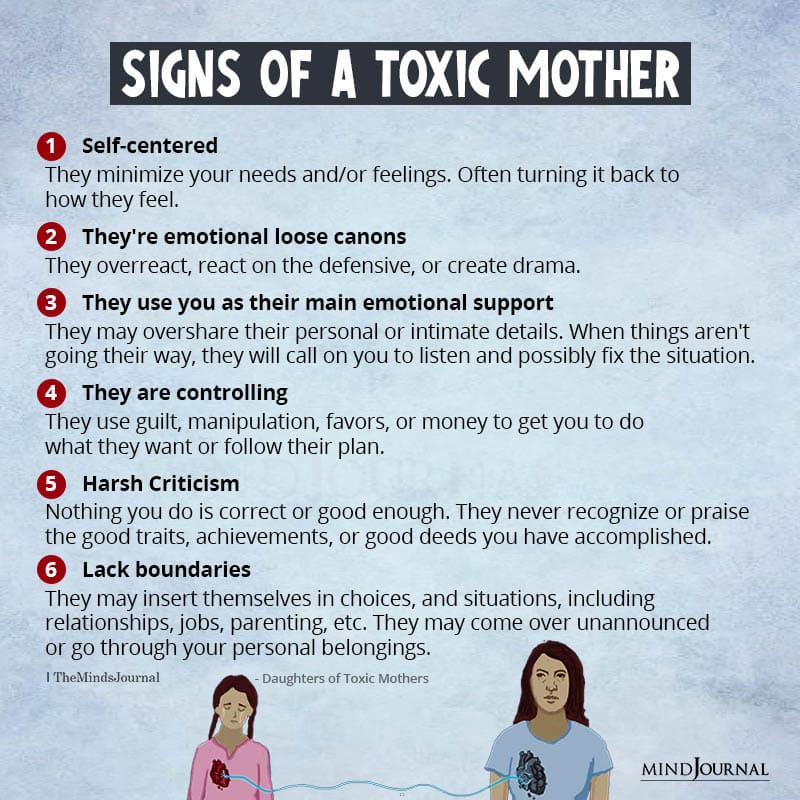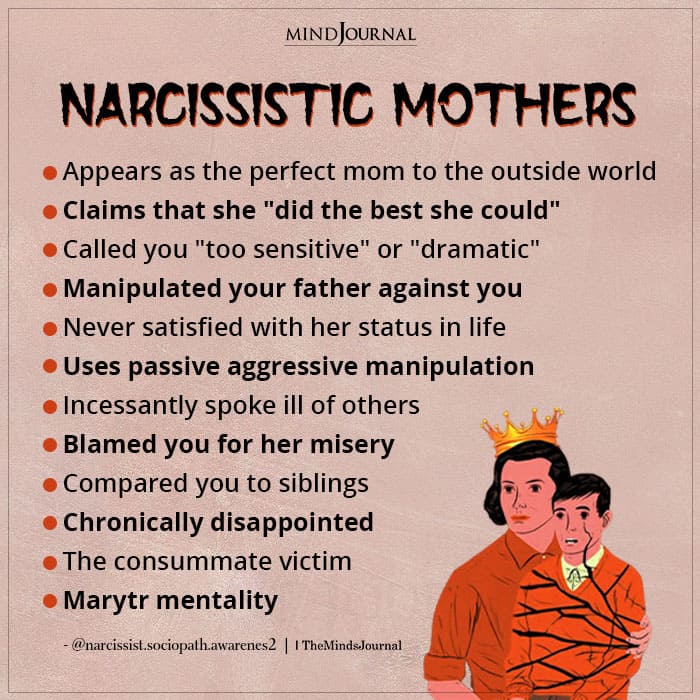Do you feel overwhelmed, smothered, or suffocated by all the love and attention your mother gives you? Perhaps you know people who feel trapped in situations where their mother’s love becomes an all-encompassing affair? This phenomenon is referred to as “The Devouring Mother Archetype.” Let’s explore what is a devouring mother and how to deal with the devouring mother archetype.
What is a Devouring Mother?
The Freudian devouring mother describes a controlling, overbearing motherly figure hampering a child’s development and independence. It is marked by possessiveness and narcissism.
As the term is not a literal description, a devouring Mother does not mean a mother who consumes her children physically. Rather it represents mothers who become overwhelming, controlling, and overprotective.
This behavior is driven by the mother’s desire to see their children safe and secure which sometimes compromises the child’s identity and autonomy.
Related: 20 Signs Of A Toxic Mother
Such mothers may be overly anxious about their children, be emotionally manipulative and use emotional blackmails to control the children and are unable to let go of her children even when they are adults.

What Drives the Development of the Devouring Mother Archetype?
The Devouring Mother archetype is primarily rooted in a number external and internal factors such as cultural and societal expectations, psychological factors and personal experiences.
As the mother may feel the social pressure to be a “good mother”, they may become increasingly insecure and controlling, which can lead to the development of this archetype. Moreover, if the mother has unmet needs or unresolved childhood traumas, she can exhibit such behaviors and become an overpowering presence.
According to a 2021 study, parents who are controlling and manipulative “are characterized by an inability to differentiate their own needs from those of their children; even more so, they fail to visualize their children or adolescents’ point of view.”
They may exhibit behaviors like affection withdrawal, guilt induction, and/or the manipulation of the parent–child relationship all to gain better control over their child.
Psychological Dynamics of the Devouring Mother Archetype
Typically, a complex combination of emotions, such as love, fear and extreme sense of responsibility leads to development of devouring mothers. For instance, a mother can think by keeping her children under control and engulfing them she may be able to protect them from danger and ensure they are safe.
Related: 25 Signs of A Controlling Parent And How To Cope With Them
However, this excessive control negatively affects the children’s emotional and psychological development, making it difficult for them to grow up confidently and independently.
How the Devouring Mother Archetype Affects the Children
There are profound implications on children growing up with a devouring mother as far as their identity and developmental processes are concerned. The child may feel like they are being suffocated, trapped or unable to find their individuality in the world.
They may have low confidence levels, low self-esteem, and may constantly seek external validation. In severe cases, devouring mothers could obstruct healthy relationships; affect personal growth and promote a cycle of dependency.

This is How to Deal with the Devouring Mother Archetype
Now that we know what is a devouring mother and have some psychological insights on the devouring mother archetype, let’s take a look at how to deal with the devouring mother.
Here are some helpful tips that can empower you to live independently –
1. Self-Awareness and Boundaries
Healing and setting up healthy boundaries can begin only when you recognize and acknowledge the presence of the Devouring Mother archetype. You need to realize that your mother’s behavior is not an indication of your abilities or worth.
Rather, it is just your mother’s fears, insecurities and worries. Establish clear boundaries that help you express your own needs using in an assertive way and ensure your own emotional well-being.
2. Seek Support
Make sure to talk to people you trust about your issues. Counselors, therapists or other professionals as well as trusted friends, family members can be relied upon for support when dealing with the Devouring Mother archetype. They will guide, affirm and provide a secure space for you to explore and express your genuine feelings.
Related: 6 Signs Of Controlling Parenting And The Long Term Effects It Has On The Child
3. Encouraging Independence and Self-Expression
Cultivating your own sense of independence and self-expression is one of the most important parts in breaking free from the Devouring Mother archetype. Create hobbies, interests, and friendships outside of what your mother influences.
Allow yourself to grow as an individual; explore personal passions and ambitions.
4. Compassion and Understanding
While it’s essential to establish boundaries prioritizing one’s well-being, it is also crucial to approach the situation with empathy and understanding. Understand that your mother’s actions may be colored and influenced by her unresolved issues or fears. This will enable you to relate better, minimizing resentment.

Takeaway
The Devouring Mother archetype is a complex force that can affect different aspects of people’s lives significantly. Knowing what is a devouring mother archetype and learning how to deal with the devouring mother can empower you to build a balanced and healthier relationship with your mother.
You can still build a sense of identity, create boundaries, and pave the way for personal growth even within the difficult framework of the Devouring Mother. With self-awareness, support from others, empathy you can steer through this maze towards freedom and fulfillment.
Related: 7 Things Common In Children Raised by Over Controlling Parents
Frequently Asked Questions (FAQs):
What is the Freudian devouring mother?
The Freudian Devouring Mother refers to an overbearing mother who negatively affects a child’s development in Freudian psychoanalytic theory.
What makes a devouring mother?
Characteristics of a Devouring Mother include being controlling, overprotective and hampering a child’s autonomy and growth.
Is devouring mother a narcissist?
A devouring mother often exhibits narcissistic traits, prioritizing her own needs over her child’s well-being.









Leave a Reply
You must be logged in to post a comment.